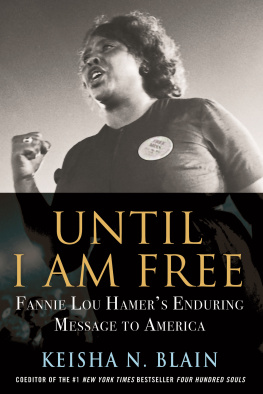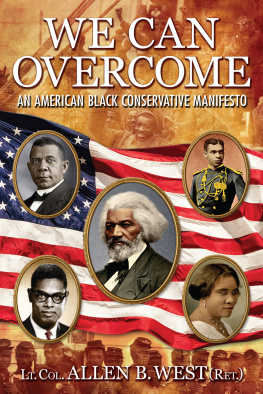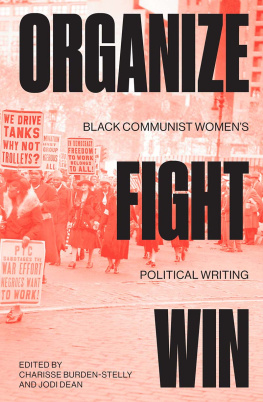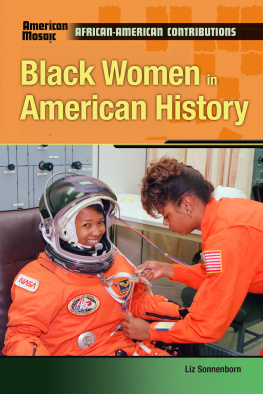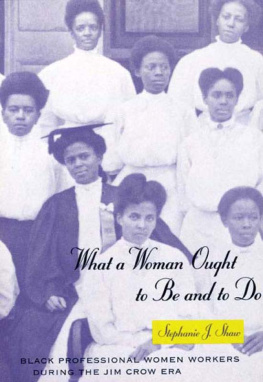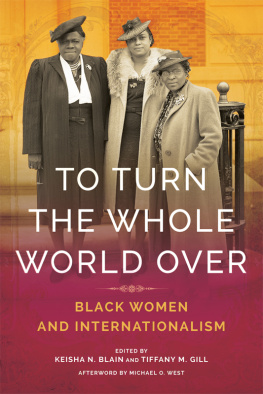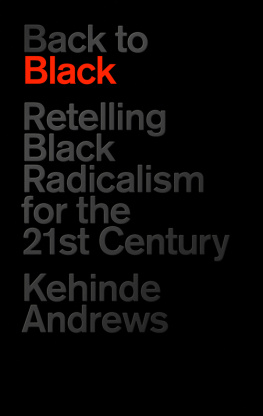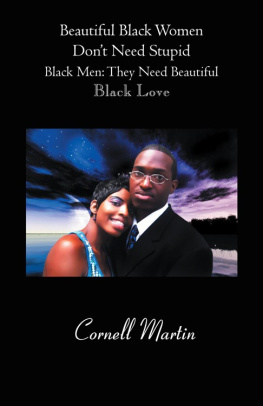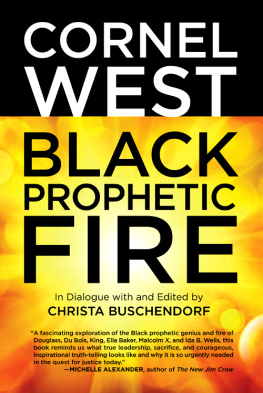SET THE WORLD ON FIRE
POLITICS AND CULTURE IN MODERN AMERICA
Series Editors:
Margot Canaday, Glenda Gilmore, Michael Kazin, Stephen Pitti, Thomas J. Sugrue
Volumes in the series narrate and analyze political and social change in the broadest dimensions from 1865 to the present, including ideas about the ways people have sought and wielded power in the public sphere and the language and institutions of politics at all levelslocal, national, and transnational. The series is motivated by a desire to reverse the fragmentation of modern U.S. history and to encourage synthetic perspectives on social movements and the state, on gender, race, and labor, and on intellectual history and popular culture.
SET THE WORLD ON FIRE

Black Nationalist Women
and the Global Struggle for Freedom
KEISHA N. BLAIN

Copyright 2018 University of Pennsylvania Press
All rights reserved. Except for brief quotations used for purposes of review or scholarly citation, none of this book may be reproduced in any form by any means without written permission from the publisher.
Published by
University of Pennsylvania Press
Philadelphia, Pennsylvania 19104-4112
www.upenn.edu/pennpress
Printed in the United States of America
on acid-free paper
2 4 6 8 10 9 7 5 3 1
Library of Congress Cataloging-in-Publication Data
Names: Blain, Keisha N., 1985 author.
Title: Set the world on fire : black nationalist women and the global struggle for freedom / Keisha N. Blain.
Other titles: Politics and culture in modern America.
Description: 1st edition. | Philadelphia : University of Pennsylvania Press, [2018] | Series: Politics and culture in modern America | Includes bibliographical references and index.
Identifiers: LCCN 2017026795 | ISBN 9780812249880 (hardcover : alk. paper)
Subjects: LCSH: Black nationalismHistory20th century. | African diasporaHistory20th century. | Pan-AfricanismHistory20th century. | African American womenPolitical activityHistory20th century. | African American women political activistsHistory20th century. | Women in politicsUnited StatesHistory.
Classification: LCC E185.6 .B65 2018 | DDC 320.54/60904dc23
LC record available at https://lccn.loc.gov/2017026795
FOR MOM, WITH LOVE
CONTENTS


We want to set the world on fire, we want freedom and justice and a chance to build for ourselves. And if we must set the world on fire... we will, like other men, die for the realization of our dreams.
Josephine Moody, We Want to Set the World on Fire, New Negro World, January 1942
SET THE WORLD ON FIRE tells the story of how a cadre of black nationalist womenMittie Maude Lena Gordon, Ethel Waddell, Celia Jane Allen, Ethel Collins, Amy Jacques Garvey, Amy Ashwood Garvey, Maymie Leona Turpeau De Mena, and several othersvigorously fought to challenge global white supremacy during the twentieth century. In various locales in the United States, including Chicago, Harlem, and the Mississippi Delta, and in other parts of the globe, including Britain and Jamaica, these women emerged as leaders in national and transnational black political movements, seeking to advance black nationalist and internationalist politics. At a moment when people of African descent were being denied full citizenship and human rights, the women profiled in this book utilized various strategies and tactics, such as letter-writing campaigns, grassroots organizing, and lobbying, to agitate for the rights and dignity of people of African descent.
Drawing on an array of previously untapped sources, including archival materials, government records, and unpublished songs and poetry, this book uncovers the previously hidden voices of black nationalist women activists and intellectuals whose ideas and activities differed significantly from their counterparts in well-known organizations such as the National Association of Colored Women (NACW), the National Association for the Advancement of Colored People (NAACP), and the National Urban League (NUL). While the activists and intellectuals in these prominent organizations were equally committed to ending racism and discrimination and eradicating the global color line, they rejected many of the ideas and strategies black nationalist women endorsed and often exhibited elitist views that caused a rift among activists. Feeling alienated from many of the ideas and political approaches of activists in mainstream civil rights organizations like the NAACP and the NUL and rejecting the Marxist platform of leftist organizations like the Communist Party, the black nationalist women chronicled in this book created spaces of their own in which to experiment with various strategies and ideologies.
Set the World on Fire centers on women leaders who were actively involved in several black political organizations of the period. Many of the women chronicled in this book were active members of Marcus Garveys Universal Negro Improvement Association (UNIA), the dominant black nationalist organization in the United States and worldwide in the immediate postWorld War I era.
While the PME and the UNIA represented the two largest black political organizations in which black nationalist women were active, they were by no means the only ones. During the twentieth century, the women profiled in this book were involved in several black political groups, including the Harlem-based Universal Ethiopian Students Association (UESA) and the As black nationalists, the women profiled in this book advocated Pan-African unity, African redemption from European colonization, racial separatism, black pride, political self-determination, and economic self-sufficiency. With few material resources during a period of much economic and political turmoil, these women asserted their political power in various locales across the United States and in other parts of the African diaspora. This book highlights black nationalist womens political organizing in the U.S. North, Midwest, and Jim Crow South and examines their transnational work and collaborations with activists in North America, Africa, Asia, Europe, Latin America, and the Caribbean.
If, as one historian has argued, the period from 1850 to 1925 was the golden age of black nationalism, its decline did not occur after Marcus Garveys deportation. During this period, women became central leaders in various black nationalist movements in the United States and other parts of the globe, agitating for racial unity, black political self-determination, and economic self-sufficiency. This is not to suggest that womens engagement in black nationalist politics prior to 1927 was insignificant or that they did not play key roles in earlier black nationalist movements. The post-Garvey moment, however, opened up unique opportunities for women in the movement to refine and redefine black nationalist politics on their own terms.
With the effective collapse of the UNIA during the mid-1920s, a vanguard of nationalist women leaders emerged on the local, national, and international scenes, practicing a pragmatic form of nationalist politics that allowed for greater flexibility, adaptability, and experimentation. The women chronicled in this book employed multiple protest strategies and tactics. They combined numerous religious and political ideologies such Given the shifting political and social terrain on which black nationalist women were fighting to combat racism and discrimination, their methods were diverse and ever-changing. For this reason, the strategies and tactics that appeared likely to help black people at one moment could be easily abandoned the next.
Next page

